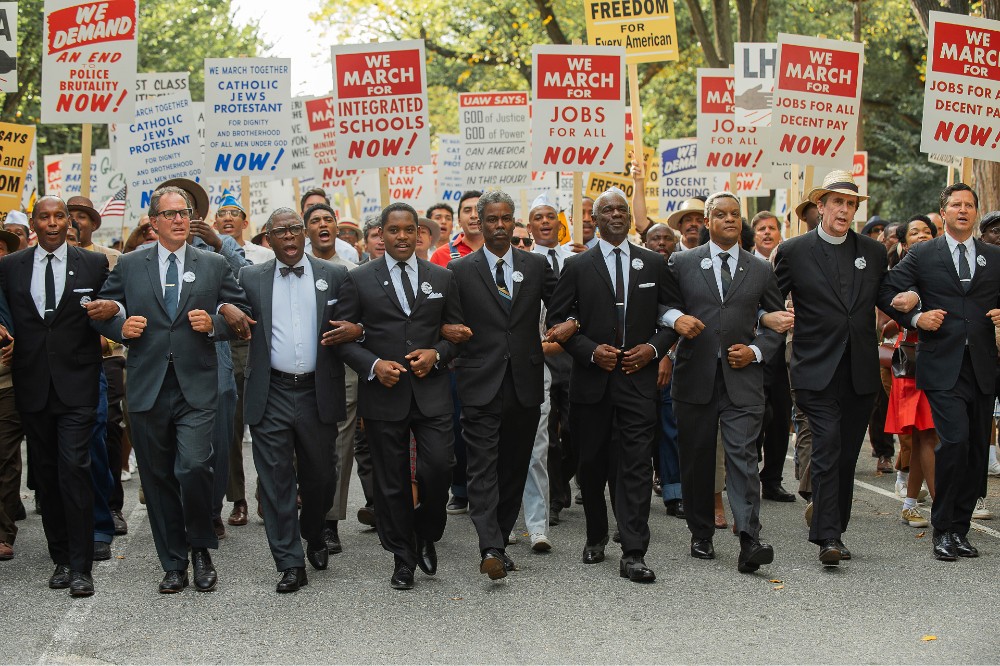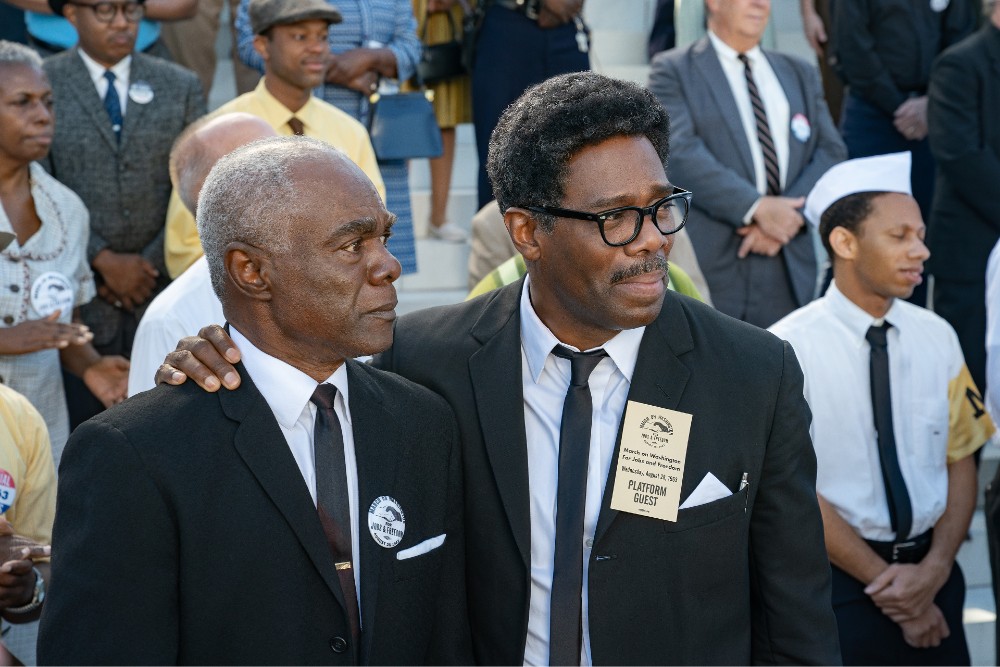
President Barack Obama produced and prerecorded an intro for the Telluride Film Festival world premiere of Netflix’s upcoming film Rustin. That alone is inherently exciting, just right for the film’s subject matter.
The story is that of a maligned civil rights leader’s herculean efforts to organize the historic March on Washington in August of 1963, to secure passage of the Civil Rights Act. The titular hero, Bayard Rustin, is embodied with gusto and proper eccentricity by a stunning Colman Domingo. The straightforward and illuminating picture promises to be one of the crowd-pleasing movies of the year and a serious awards contender if Netflix pushes the right buttons.
When Rustin opens, director George C. Wolfe (Ma Rainey’s Black Bottom) trains his gentle lens on Domingo as he lobbies Aml Ameen as Martin Luther King, Jr. to become a de facto leader of the struggle for racial equality in a still segregated America. Moments later, when Rustin tries to storm the Democratic National Convention in Los Angeles in 1960 in a peaceful protest, powerful political interests within the movement itself ensure his ouster with threats of false rumors about a love affair between him and King. Rustin, naively confident in his relationship with King, fakes a resignation that King surprisingly accepts, leading the titular character to spend a few years turning his activism wheels elsewhere until the right moment.

Flash forward to 1963, and the activist once again sees an opportunity. Racial tensions bubbling in the south lead Kennedy to announce a civil rights law, and Rustin decides that a powerful demonstration of political power is the only way to secure it. Slowly, he works his way back in, fighting against powerful black opponents, including the head of the NAACP played by Chris Rock, Congressman Adam Clayton Powell, Jr. (Jeffrey Wright), and certain labor organizers. On his corner are activist Ella Baker (Audra Macdonald) and labor activist A. Philip Randolph (Glynn Turman), and at least two male love interests (played by Gus Halper and Johnny Ramey).
It is a who’s who of the civil rights era, but Wolfe’s camera and the straightforward script by Oscar winner Dustin Lance Black and Julian Breece rightly keep the focus on Rustin. You will not hear words about dreams, and that is by design. The idea is to revive a character that had been wrongfully maligned by other leaders of the era, and in that sense Rustin is a triumph. It also succeeds in recounting an uncomplicated and undemanding logistical organization for the march itself, layered in between the backroom contrivances of the time.

The film’s best moments are when younger activists, inspired by Rustin’s true-to-the-bone convictions, take to the streets to raise funds, organize labor leaders and churches, and explain their plight to theoretically sympathetic but fundamentally disinterested audiences. To the extent the movie becomes a proxy for celebrating the historic vision and achievement that these people put together, led by one improbable leader on the backend, it is worth every accolade.
Beyond that, Rustin is an upfront movie that makes some curious choices about tone. At the outset, the script adopts a playful tone that seems incoherent with the gravity of the moment in Rustin’s ouster. That sort of sing-song approach persists in Brandford Marsalis’s score and makes sense when the movie covers, in rapidly edited fashion, the various steps taken to construct a March on Washington headquarters from the ground up.
It is a difficult to understand the choice, however, when it comes to portraying the brutally unfair treatment of a committed civil rights worker who was rejected by those around him based on an immutable characteristic. It is meant to be a film that is accessible to most audiences—it is a good conceit in the context of spreading this story far and wide, but it does not necessarily make for compelling or transcendental filmmaking.
Rustin’s grappling with his own sexuality is also given short thrift. He is unable to fully commit himself in those moments, an issue the script ascribes to his dedication to the cause. That notion is itself difficult to square with Rustin’s decision, later on, to step aside at the moment of crowning glory. Given that the film is ultimately focused on redeeming the forgotten character—Obama mentions the Presidential Medal of Freedom after all—it is confounding that it does not bother to explain why or how Rustin was again ousted from good standing after having been readmitted into the fold.

The single most compelling reaching to watch this film—aside from the historical curiosity—is Domingo’s performance. Slowly but surely he has developed into one of the most complex and complete actors working today. While those first few unfortunate scenes suggest he may overact along with the inconsistent tone of the script, Domingo settles nicely into the role as the movie permits him to do so. Scene by scene, Domingo embodies this character with his quirks, his sayings, his flaws, and his ability to finally express tender emotion in addition to solid conviction and determination.
Some—even most—films about serious historical moments convey the gravitas of the proceedings with drama in their execution, from acting, to score, to lighting. Rustin makes a different choice, to abandon the tragedy and exalt the achievement. It is a celebration. While that awkward juxtaposition is at times difficult to square in the script’s tone, Rustin is successful. The riveting performance at the heart of the film is most of the reason why.
Grade: B
Rustin had its World Premiere at the Telluride Film Festival and will be released by Netflix in theaters on November 3, 2023.
Twitter: @jdonbirnam
Instagram: @awards_predix





